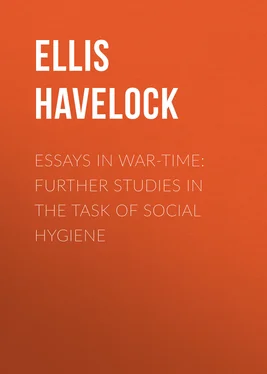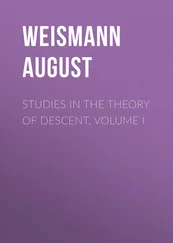Havelock Ellis - Essays in War-Time - Further Studies in the Task of Social Hygiene
Здесь есть возможность читать онлайн «Havelock Ellis - Essays in War-Time - Further Studies in the Task of Social Hygiene» — ознакомительный отрывок электронной книги совершенно бесплатно, а после прочтения отрывка купить полную версию. В некоторых случаях можно слушать аудио, скачать через торрент в формате fb2 и присутствует краткое содержание. Жанр: psy_sex_and_family, foreign_psychology, foreign_edu, на английском языке. Описание произведения, (предисловие) а так же отзывы посетителей доступны на портале библиотеки ЛибКат.
- Название:Essays in War-Time: Further Studies in the Task of Social Hygiene
- Автор:
- Жанр:
- Год:неизвестен
- ISBN:нет данных
- Рейтинг книги:5 / 5. Голосов: 1
-
Избранное:Добавить в избранное
- Отзывы:
-
Ваша оценка:
- 100
- 1
- 2
- 3
- 4
- 5
Essays in War-Time: Further Studies in the Task of Social Hygiene: краткое содержание, описание и аннотация
Предлагаем к чтению аннотацию, описание, краткое содержание или предисловие (зависит от того, что написал сам автор книги «Essays in War-Time: Further Studies in the Task of Social Hygiene»). Если вы не нашли необходимую информацию о книге — напишите в комментариях, мы постараемся отыскать её.
Essays in War-Time: Further Studies in the Task of Social Hygiene — читать онлайн ознакомительный отрывок
Ниже представлен текст книги, разбитый по страницам. Система сохранения места последней прочитанной страницы, позволяет с удобством читать онлайн бесплатно книгу «Essays in War-Time: Further Studies in the Task of Social Hygiene», без необходимости каждый раз заново искать на чём Вы остановились. Поставьте закладку, и сможете в любой момент перейти на страницу, на которой закончили чтение.
Интервал:
Закладка:
An honest and careful record of facts, however, is always valuable. Dr. Woods' investigation will be found useful even by those who are by no means anxious to throw cold water over the too facile optimism of some pacifists, and this little book suggests lines of thought which may prove fruitful in various directions, not always foreseen by the authors.
Dr. Woods emphasises the long period in the history of the human race during which war has flourished. He seems to suggest that war, after all, may be an essential and beneficial element in human affairs, destined to endure to the end, just as it has been present from the beginning. But has it been present from the beginning? Even though war may have flourished for many thousands of years—and it was certainly flourishing at the dawn of history—we are still very far indeed from the dawn of human life or even of human civilisation, for the more our knowledge of the past grows the more remote that dawn is seen to be. It is not only seen to be very remote, it is seen to be very important. Darwin said that it was during the first three years of life that a man learnt most. That saying is equally true of humanity as a whole, though here one must translate years into hundreds of thousands of years. But neither infant man nor infant mankind could establish themselves firmly on the path that leads so far if they had at the very outset, in accordance with Dr. Woods' formula for more recent ages, "fought about half the time." An activity of this kind which may be harmless, or even in some degree beneficial at a later stage, would be fatally disastrous at an early stage. War, as Mankind understands war, seems to have no place among animals living in Nature. It seems equally to have had no place, so far as investigation has yet been able to reveal, in the life of early man. Men were far too busy in the great fight against Nature to fight against each other, far too absorbed in the task of inventing methods of self-preservation to have much energy left for inventing methods of self-destruction. It was once supposed that the Homeric stories of war presented a picture of life near the beginning of the world. The Homeric picture in fact corresponds to a stage in human barbarism, certainly in its European manifestation, a stage also passed through in Northern Europe, where, nearly fifteen hundred years ago, the Greek traveller, Posidonius, found the Celtic chieftains in Britain living much like the people in Homer. But we now know that Homer, so far from bringing before us a primitive age, really represents the end of a long stage of human development, marked by a slow and steady growth in civilisation and a vast accumulation of luxury. War is a luxury, in other words a manifestation of superfluous energy, not possible in those early stages when all the energies of men are taken up in the primary business of preserving and maintaining life. So it was that war had a beginning in human history. Is it unreasonable to suppose that it will also have an end?
There is another way, besides that of counting the world's war-years, to determine the probability of the diminution and eventual disappearance of war. We may consider the causes of war, and the extent to which these causes are, or are not, ceasing to operate. Dr. Woods passingly realises the importance of this test and even enumerates what he considers to be the causes of war, without, however, following up his clue. As he reckons them, they are four in number: racial, economic, religious, and personal. There is frequently a considerable amount of doubt concerning the cause of a particular war, and no doubt the causes are usually mixed and slowly accumulative, just as in disease a number of factors may have gradually combined to bring on the sudden overthrow of health. There can be no doubt that the four causes enumerated have been very influential in producing war. There can, however, be equally little doubt that nearly all of them are diminishing in their war-producing power. Religion, which after the Reformation seemed to foment so many wars, is now practically almost extinct as a cause of war in Europe. Economic causes which were once regarded as good and sound motives for war have been discredited, though they cannot be said to be abolished; in the Middle Ages fighting was undoubtedly a most profitable business, not only by the booty which might thus be obtained, but by the high ransoms which even down to the seventeenth century might be legitimately demanded for prisoners. So that war with France was regarded as an English gentleman's best method of growing rich. Later it was believed that a country could capture the "wealth" of another country by destroying that country's commerce, and in the eighteenth century that doctrine was openly asserted even by responsible statesmen; later, the growth of political economy made clear that every nation flourishes by the prosperity of other nations, and that by impoverishing the nation with which it traded a nation impoverishes itself, for a tradesman cannot grow rich by killing his customers. So it came about that, as Mill put it, the commercial spirit, which during one period of European history was the principal cause of war, became one of its strongest obstacles, though, since Mill wrote, the old fallacy that it is a legitimate and advantageous method to fight for markets, has frequently reappeared. 20 20 It has been argued (as by Filippi Carli, La Ricchezza e la Guerra , 1916) that the Germans are especially unable to understand that the prosperity of other countries is beneficial to them, whether or not under German control, and that they differ from the English and French in believing that economic conquests should involve political conquests.
Again, the personal causes of war, although in a large measure incalculable, have much smaller scope under modern conditions than formerly. Under ancient conditions, with power centred in despotic monarchs or autocratic ministers, the personal causes of war counted for much. In more recent times it has been said, truly or falsely, that the Crimean War was due to the wounded feelings of a diplomatist. Under modern conditions, however, the checks on individual initiative are so many that personal causes must play an ever-diminishing part in war.
The same can scarcely be said as regards Dr. Woods' remaining cause of war. If by racialism we are to understand nationalism, this has of late been a serious and ever-growing provocative of war. Internationalism of feeling is much less marked now than it was four centuries ago. Nationalities have developed a new self-consciousness, a new impulse to regain their old territories or to acquire new territories. Not only Pan-Germanism, Pan-Slavism, and British Imperialism, like all other imperialisms, but even the national ambitions of some smaller Powers have acquired a new and dangerous energy. They are not the less dangerous when, as is indeed most frequently the case, they merely represent the ambition, not of the people as a whole, but merely of a military or bureaucratic clique, of a small chauvinistic group, yet noisy and energetic enough to win over unscrupulous politicians. A German soldier, a young journalist of ability, recently wrote home from the trenches: "I have often dreamed of a new Europe in which all the nations would be fraternally united and live together as one people; it was an end which democratic feeling seemed to be slowly preparing. Now this terrible war has been unchained, fomented by a few men who are sending their subjects, their slaves rather, to the battlefield, to slay each other like wild beasts. I should like to go towards these men they call our enemies and say, 'Brothers, let us fight together. The enemy is behind us.' Yes, since I have been wearing this uniform I feel no hatred for those who are in front, but my hatred has grown for those in power who are behind." That is a sentiment which must grow mightily with the growth of democracy, and as it grows the danger of nationalism as a cause of war must necessarily decrease.
Читать дальшеИнтервал:
Закладка:
Похожие книги на «Essays in War-Time: Further Studies in the Task of Social Hygiene»
Представляем Вашему вниманию похожие книги на «Essays in War-Time: Further Studies in the Task of Social Hygiene» списком для выбора. Мы отобрали схожую по названию и смыслу литературу в надежде предоставить читателям больше вариантов отыскать новые, интересные, ещё непрочитанные произведения.
Обсуждение, отзывы о книге «Essays in War-Time: Further Studies in the Task of Social Hygiene» и просто собственные мнения читателей. Оставьте ваши комментарии, напишите, что Вы думаете о произведении, его смысле или главных героях. Укажите что конкретно понравилось, а что нет, и почему Вы так считаете.












